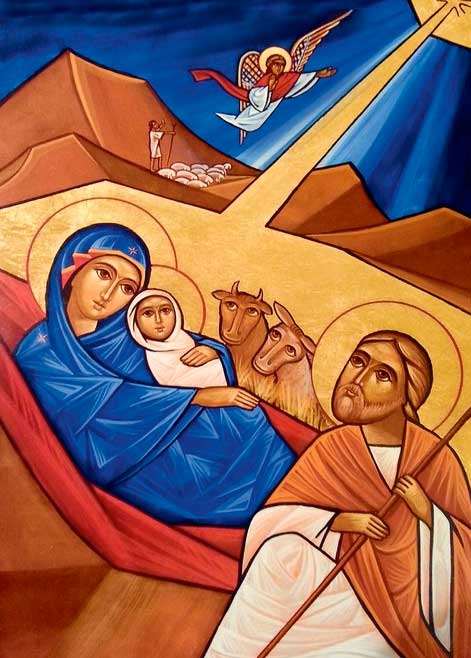Brother, Who Art Thou?
The Family of the Child Who Loved the World
November 30, 2018
On Black Friday, my wife and I shopped for Christmas cards for my mother to send, who is a devout Christian and who wanted a Christ-centered message to be conveyed by the card. Such cards are getting scarcer. You must search. One card especially fit the bill. It even included John 3:16 on the inside.

Another card I looked at seemed vaguely Christian on the outside—I forget what it said—but inside it dissolved into a vapor about how Christmas—or was it "the season"?—means that everyone is one and connected. That's it. End of message. Al-Qaeda and Christians, pro-lifers and NOW, Marxists and pacifists, Putin and Pelosi, you me and the moon, we're all one Happy Holidays family, only we don't show it.
Actually, we never were a happy family, not since the first family arrived, after Abel was second-born after Cain and they grew up together-and apart. Here, the word brother first appears. God adds it to the name Abel: "Where is Abel your brother?" "The voice of your brother's blood" is crying out. The earth had opened to receive "your brother's blood from your hand." This murdered man is connected to you, Cain, he is not just a man named Abel, he is your brother.
In the Old Testament, brothers means more than siblings, but also fellow countrymen, fellow Hebrews. Would a Jew call a Samaritan his brother? I don't think so. He needed stiff encouragement just to call him his neighbor.
Brotherhood is based on a common parentage, tribe, nation, or some other common binding force. From the Jewish Encyclopedia:
• Friends by concluding a covenant become actual brothers (II Sam. i. 26; Amos i. 9-"berit a?im" [covenant of brothers]; compare "a?avah" [brotherhood], Zech. xi. 14)
• The name "brother" has a higher meaning, and implies brotherly sentiment, in such verses as: "Open thine hand wide unto thy brother, to thy poor" (Deut. xv. 11); "Lest by exceeding the number of stripes thy brother should be vilified unto thee" (Deut. xxv. 3, Hebr.); "Fear thy God that thy brother may live with thee" (Lev. xxv. 36).
• Finally, the word "brother" means a fellow-man as son of the same God and Father: "At the hand of every man's brother will I require life" (Gen. ix. 5). "Have we not all one father? hath not one God created us? Why do we deal treacherously every man against his brother" (Mal. ii. 10).
While the world was created for brotherhood, it is fallen and murderous. Brotherhood must be reconstituted on a new common source: "I will draw all men to myself"—this is the only life-giving source of brotherhood that the fallen sons of Adam have. Our Source appeared on Christmas and ran through Good Friday and beyond.
For he who sanctifies and those who are sanctified all have one source.That is why he is not ashamed to call them brothers, saying,
"I will tell of your name to my brothers; in the midst of the congregation I will sing your praise." And again, "Behold, I and the children God has given me." Since therefore the children share in flesh and blood, he himself likewise partook of the same things. . . Heb. 2:11-15
That Christ has "children" was prophesied:
When he makes himself an offering for sin, he shall see his offspring... the fruit of the travail of his soul and be satisfied. Isaiah 53:10-11
But he also calls them brothers. After the Resurrection, Jesus says to the women in Matthew 28:10: "Do not be afraid; go and tell my brothers to go to Galilee, and there they will see me."
In John 20:17, Jesus said to Mary Magdalene, "Do not cling to me, for I have not yet ascended to the Father; but go to my brothers and say to them, 'I am ascending to my Father and your Father, to my God and your God.'"
In both cases, Jesus does not call his disciples brothers until after the Resurrection, when they become adopted sons with the Son.
The brotherhood of Man, then, is only realized through a new birth (the new b'rith—covenant) through union with Christ. To enter this eternal brotherhood of man, "You must be born again," says Jesus in John 3:7. That's not quite John 3:16 . . . but it's pretty close.
Yours for Christ, Creed & Culture,

James M. Kushiner
Executive Director, The Fellowship of St. James
—James M. Kushiner is Executive Editor of Touchstone: A Journal of Mere Christianity, and Executive Director of The Fellowship of St. James.






